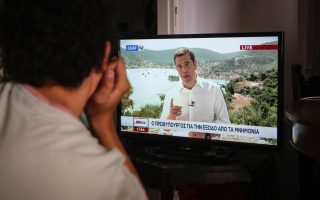Faith in the unknown

The referendum turned into a great vote of confidence in Prime Minister Alexis Tsipras. The vast majority was persuaded by his arguments in favor of a “no” vote and made him master of the Greek political scene.
The government's efforts so far have not brought any improvement to the economy or to citizens' lives, so we must conclude that this strong “no” rewards its tactics in the hope that in the end they will bear fruit. This was, in effect, a vote of confidence in the unknown.
We do not know what course our country will take in the next days and weeks, when it will depend on our partners in the European Union and the European Central Bank whether our economy and citizens will have enough money to stay alive. We do not know what the true result of the referendum was, because the question was so confusing and the arguments of Mr. Tsipras and his allies so misleading and contradictory that we cannot know what we voted for, nor how our vote will be interpreted. Was a “yes” vote in favor of Greece staying in the euro and the European Union, was it in favor of endless austerity, was it a declaration of national betrayal? Was the “no” in favor of a deal with our partners that would be perhaps slightly better than the one they offered on June 25 (as mentioned in the referendum question) or a decree for the government to walk away from the talks, and, consequently, lead Greece out of the eurozone?
All of these questions were in the air during the past week's public debate. The “no” vote was presented by the government as a brave and dignified stand against the enemies (our European allies) who proposed the deal and their lackeys in Greece who supported it. The government also managed to evade responsibility for the tactics that lead to the closing of banks and the imposition of capital controls, with all that this cost citizens and businesses. The short time between the call of the referendum and the voting helped achieve this. On the other hand, the “yes” side did not have the cohesion of the government and its partners in the “no” camp (the rightwing national ANEL and the nazi Golden Dawn). Also, the “yes” side could not get far with a call for difficult decisions when the SYRIZA government was carrying the debate with more promises that sacrifices could be avoided. In this way, the “no” camp was able to burden the supporters of “yes” with all the woes suffered by citizens, even though these are the result of five months of fruitless negotiations with the troika of creditors and our partners.
The great question now is how the government will use this mighty “no” outside Greece. It is not clear that our country's negotiating position was strengthened by the vote. It may have fortified Mr. Tsipras politically inside Greece but it does not change the reality of our relationship with Europe and the International Monetary Fund. On June 30, Greece defaulted on the IMF and our loan agreement with the troika expired. Also, the ECB did not increase emergency funding. It is highly unlikely that a continuation of the impasse will frighten our partners more than it did before the vote. So if they make any concessions to us it will be to prevent our economy's collapse. They will be acting out of pity rather than surrendering to our demands.
Finding himself in a dead-end ten days ago, Mr. Tsipras passed his responsibilities on to the people. They, by giving overwhelming support to the “no” that he wanted, passed responsibility back to him. Now he and only he has responsibility for what happens from now on. Just as he did ten days ago. After all the shouting, the division and the humiliation suffered by citizens in the past week, what did the Greeks gain? How do we get out of the impasse? That's still unknown.





